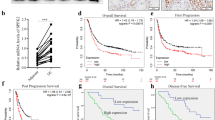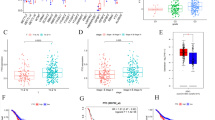Abstract
N6-methyladenosine (m6A) mRNA methylation has been considered a gene modulatory mechanism involved in disease progression and carcinogenesis. Herein, we aimed to explore the specific mechanism of m6A mRNA methylation in endometrial cancer. RT-qPCR was implemented to test the clinical correlation between m6A methylation and endometrial cancer. Bioinformatics analysis was performed to screen the genes related to endometrial cancer, and SRAMP was utilized for the prediction of m6A targets. Western blot assay and MeRIP-qPCR experiments were conducted to verify the effect of m6A methylation on the candidate genes and the signaling pathways involved in the occurrence of endometrial cancer. m6A-seq, RT-qPCR, and polysome profiling were used to confirm the mechanisms of m6A methylation in modulating related genes and pathways. The levels of m6A methylation, METTL3, and IGFBP4 were reduced in tumor tissues of patients with endometrial cancer, and SRAMP analysis confirmed that IGFBP4 and PAPPA had m6A methylation sites. Reduced m6A methylation promoted endometrial cancer cell progression and tumor formation in vivo. m6A methylation of RNA in endometrial cancer cells directly modulated IGFBP4 and PAPPA expression. m6A methylation regulated the PAPPA/IGFBP4 axis, thereby influencing endometrial cancer through the NF-κB and ERK signaling pathways. Knockdown of PAPPA or overexpression of IGFBP4 in endometrial cancer cells partially reduced disease progression caused by reduced m6A methylation. This research suggests that m6A mRNA methylation modulates the ERK/NF-κB/AKT signaling pathway through the PAPPA/IGFBP4 axis to induce cell proliferation and tumor formation in endometrial cancer.
Graphical abstract
1. METTL3 expressed modestly and m6A methylation of IGFBP4 and PAPPA mRNAs decreased in endometrial cancer;
2. YTHDF1-mediated IGFBP4 translation was reduced in HEC-1-A and AN3CA cells, and YTHDF2-mediated PAPPA mRNA degradation was blunted but its protein expression increased;
3. Increased PAPPA and reduced IGFBP4 activated IGF1-induced ERK, AKT, and NF-κB pathways by binding IGFR, thereby promoting cancer cell malignancy.







Similar content being viewed by others
Data availability
The datasets used or analyzed during the current study are available from the corresponding author on reasonable request.
Code availability
Not applicable.
References
Bell DW, Ellenson LH. Molecular Genetics of Endometrial Carcinoma. Annu Rev Pathol. 2019;14:339–67.
Boldt HB, Conover CA. Pregnancy-associated plasma protein-A (PAPP-A): a local regulator of IGF bioavailability through cleavage of IGFBPs. Growth Horm IGF Res. 2007;17(1):10–8.
Boldt HB, Conover CA. Overexpression of pregnancy-associated plasma protein-A in ovarian cancer cells promotes tumor growth in vivo. Endocrinology. 2011;152(4):1470–8.
Brooks RA, Fleming GF, Lastra RR, Lee NK, Moroney JW, Son CH, Tatebe K, et al. Current recommendations and recent progress in endometrial cancer. CA Cancer J Clin. 2019;69(4):258–79.
Burja B, Kuret T, Janko T, Topalovic D, Zivkovic L, Mrak-Poljsak K, Spremo-Potparevic B, et al. Olive leaf extract attenuates inflammatory activation and DNA damage in human arterial endothelial cells. Front Cardiovasc Med. 2019;6:56.
Cai Y, Feng R, Lu T, Chen X, Zhou X, Wang X. Novel insights into the m(6)A-RNA methyltransferase METTL3 in cancer. Biomark Res. 2021;9(1):27.
Colombo N, Preti E, Landoni F, Carinelli S, Colombo A, Marini C, Sessa C, et al. Endometrial cancer: ESMO Clinical Practice Guidelines for diagnosis, treatment and follow-up. Ann Oncol. 2013;24 Suppl 6:vi33-38.
Dedes KJ, Wetterskog D, Ashworth A, Kaye SB, Reis-Filho JS. Emerging therapeutic targets in endometrial cancer. Nat Rev Clin Oncol. 2011;8(5):261–71.
Deng R, Cheng Y, Ye S, Zhang J, Huang R, Li P, Liu H, et al. m(6)A methyltransferase METTL3 suppresses colorectal cancer proliferation and migration through p38/ERK pathways. Onco Targets Ther. 2019;12:4391–402.
Deng X, Su R, Weng H, Huang H, Li Z, Chen J. RNA N(6)-methyladenosine modification in cancers: current status and perspectives. Cell Res. 2018;28(5):507–17.
Dou Y, Kawaler EA, Cui Zhou D, Gritsenko MA, Huang C, Blumenberg L, Karpova A, et al. Proteogenomic characterization of endometrial carcinoma. Cell. 2020;180(4):729-748 e726.
Fellenberg J, Sahr H, Liu L, Schonsiegel F, Depeweg D, Lehner B, Herr I. Rescue of silenced UCHL1 and IGFBP4 expression suppresses clonogenicity of giant cell tumor-derived stromal cells. Cancer Lett. 2013;336(1):61–7.
Guo Y, Bao Y, Guo D, Yang W. Pregnancy-associated plasma protein a in cancer: expression, oncogenic functions and regulation. Am J Cancer Res. 2018;8(6):955–63.
He J, Zhou M, Yin J, Wan J, Chu J, Jia J, Sheng J, et al. METTL3 restrains papillary thyroid cancer progression via m(6)A/c-Rel/IL-8-mediated neutrophil infiltration. Mol Ther. 2021;29(5):1821–37.
Hjortebjerg R. IGFBP-4 and PAPP-A in normal physiology and disease. Growth Horm IGF Res. 2018;41:7–22.
Huang H, Weng H, Chen J. m(6)A Modification in coding and non-coding RNAs: roles and Therapeutic Implications in Cancer. Cancer Cell. 2020;37(3):270–88.
Huang J, Tabata S, Kakiuchi S, Van The T, Goto H, Hanibuchi M, Nishioka Y. Identification of pregnancy-associated plasma protein A as a migration-promoting gene in malignant pleural mesothelioma cells: a potential therapeutic target. Oncotarget. 2013;4(8):1172–84.
Lee YY, Mok MT, Kang W, Yang W, Tang W, Wu F, Xu L, et al. Loss of tumor suppressor IGFBP4 drives epigenetic reprogramming in hepatic carcinogenesis. Nucleic Acids Res. 2018;46(17):8832–47.
Li W, Li H, Zhou L, Wang Z, Hua B. Pregnancy-Associated Plasma Protein A Induces Inflammatory Cytokine Expression by Activating IGF-I/PI3K/Akt Pathways. Mediators Inflamm. 2019;2019:8436985.
Liu J, Eckert MA, Harada BT, Liu SM, Lu Z, Yu K, Tienda SM, et al. m(6)A mRNA methylation regulates AKT activity to promote the proliferation and tumorigenicity of endometrial cancer. Nat Cell Biol. 2018;20(9):1074–83.
Liu J, Harada BT, He C. Regulation of Gene Expression by N(6)-methyladenosine in Cancer. Trends Cell Biol. 2019;29(6):487–99.
Liu Z, Hong Z, Qu P. Proteomic analysis of human endometrial tissues reveals the roles of PI3K/AKT/mTOR pathway and tumor angiogenesis molecules in the pathogenesis of endometrial cancer. Biomed Res Int. 2020;2020:5273969.
Lu KH, Broaddus RR. Endometrial Cancer. N Engl J Med. 2020;383(21):2053–64.
Mansfield AS, Visscher DW, Hart SN, Wang C, Goetz MP, Oxvig C, Conover CA. Pregnancy-associated plasma protein-A expression in human breast cancer. Growth Horm IGF Res. 2014;24(6):264–7.
Marzocchi C, Capezzone M, Sagnella A, Cartocci A, Caroli Costantini M, Brindisi L, Mancini V, et al. Pregnancy-associated plasma protein A mRNA expression as a marker for differentiated thyroid cancer: results from a “surgical” and a “cytological” series. J Endocrinol Invest. 2021;45(2):369–78.
Mizumoto Y, Kyo S, Kiyono T, Takakura M, Nakamura M, Maida Y, Mori N, et al. Activation of NF-kappaB is a novel target of KRAS-induced endometrial carcinogenesis. Clin Cancer Res. 2011;17(6):1341–50.
Morice P, Leary A, Creutzberg C, Abu-Rustum N, Darai E. Endometrial cancer. Lancet. 2016;387(10023):1094–108.
Pan H, Hanada S, Zhao J, Mao L, Ma MZ. Protein secretion is required for pregnancy-associated plasma protein-A to promote lung cancer growth in vivo. PLoS ONE. 2012;7(11):e48799.
Pang X, Zhang X, Huang Y, Qian S. Development and validation of m6A regulators’ prognostic significance for endometrial cancer. Medicine (Baltimore). 2021;100(26):e26551.
Ping XL, Sun BF, Wang L, Xiao W, Yang X, Wang WJ, Adhikari S, et al. Mammalian WTAP is a regulatory subunit of the RNA N6-methyladenosine methyltransferase. Cell Res. 2014;24(2):177–89.
Prithviraj P, Anaka M, Thompson EW, Sharma R, Walkiewicz M, Tutuka CSA, Behren A, et al. Aberrant pregnancy-associated plasma protein-A expression in breast cancers prognosticates clinical outcomes. Sci Rep. 2020;10(1):13779.
Roque DR, Makowski L, Chen TH, Rashid N, Hayes DN, Bae-Jump V. Association between differential gene expression and body mass index among endometrial cancers from The Cancer Genome Atlas Project. Gynecol Oncol. 2016;142(2):317–22.
Shi Y, Zheng C, Jin Y, Bao B, Wang D, Hou K, Feng J, et al. Reduced expression of METTL3 promotes metastasis of triple-negative breast cancer by m6a methylation-mediated COL3A1 up-regulation. Front Oncol. 2020;10:1126.
Smith YE, Toomey S, Napoletano S, Kirwan G, Schadow C, Chubb AJ, Mikkelsen JH, et al. Recombinant PAPP-A resistant insulin-like growth factor binding protein 4 (dBP4) inhibits angiogenesis and metastasis in a murine model of breast cancer. BMC Cancer. 2018;18(1):1016.
Takabatake Y, Oxvig C, Nagi C, Adelson K, Jaffer S, Schmidt H, Keely PJ, et al. Lactation opposes pappalysin-1-driven pregnancy-associated breast cancer. EMBO Mol Med. 2016;8(4):388–406.
Tang SL, Chen WJ, Yin K, Zhao GJ, Mo ZC, Lv YC, Ouyang XP, et al. PAPP-A negatively regulates ABCA1, ABCG1 and SR-B1 expression by inhibiting LXRalpha through the IGF-I-mediated signaling pathway. Atherosclerosis. 2012;222(2):344–54.
Urick ME, Bell DW. Clinical actionability of molecular targets in endometrial cancer. Nat Rev Cancer. 2019;19(9):510–21.
Wang X, Lu Z, Gomez A, Hon GC, Yue Y, Han D, Fu Y, et al. N6-methyladenosine-dependent regulation of messenger RNA stability. Nature. 2014;505(7481):117–20.
Wang X, Zhao BS, Roundtree IA, Lu Z, Han D, Ma H, Weng X, et al. N(6)-methyladenosine Modulates Messenger RNA Translation Efficiency. Cell. 2015;161(6):1388–99.
Wright JD, BarrenaMedel NI, Sehouli J, Fujiwara K, Herzog TJ. Contemporary management of endometrial cancer. Lancet. 2012;379(9823):1352–60.
Wu Y, Chang N, Zhang Y, Zhang X, Xu L, Che Y, Qiao T, et al. METTL3-mediated m(6)A mRNA modification of FBXW7 suppresses lung adenocarcinoma. J Exp Clin Cancer Res. 2021;40(1):90.
Zhou Y, Zeng P, Li YH, Zhang Z, Cui Q. SRAMP: prediction of mammalian N6-methyladenosine (m6A) sites based on sequence-derived features. Nucleic Acids Res. 2016;44(10):e91.
Funding
Thanks for the grants from the National Natural Science Foundation of China (No. 81801421).
Author information
Authors and Affiliations
Contributions
RP and TAL conceived the ideas. RP, TAL, and WSJ designed the experiments. RP, YCY, and HXH performed the experiments. RP and SPX analyzed the data. RP and TAL provided critical materials. RP, TAL, and WSJ wrote the manuscript. LHX supervised the study. All the authors have read and approved the final version for publication.
Corresponding author
Ethics declarations
Ethics approval
The clinical and animal experiments were ratified by the ethics committee of of Renmin Hospital of Wuhan University and the relevant studies were completed within the scope of ethical regulations. The clinical experiments conformed to the Declaration of Helsinki. All subjects had provided their written informed consent. All animal experiments were in strict accordance with the rules and regulations and operating norms for the management of experimental animals and the relevant ethical requirements of experimental animals.
Informed consent
Informed consent was obtained from all individual participants included in the study.
Conflict of interest
The authors declare no competing interests.
Additional information
Publisher's note
Springer Nature remains neutral with regard to jurisdictional claims in published maps and institutional affiliations.
Springer Nature or its licensor holds exclusive rights to this article under a publishing agreement with the author(s) or other rightsholder(s); author self-archiving of the accepted manuscript version of this article is solely governed by the terms of such publishing agreement and applicable law.
Supplementary Information
Below is the link to the electronic supplementary material.
Rights and permissions
About this article
Cite this article
Ruan, P., Wang, S., Yang, C. et al. m6A mRNA methylation regulates the ERK/NF-κB/AKT signaling pathway through the PAPPA/IGFBP4 axis to promote proliferation and tumor formation in endometrial cancer. Cell Biol Toxicol 39, 1611–1626 (2023). https://doi.org/10.1007/s10565-022-09751-z
Received:
Accepted:
Published:
Issue Date:
DOI: https://doi.org/10.1007/s10565-022-09751-z




